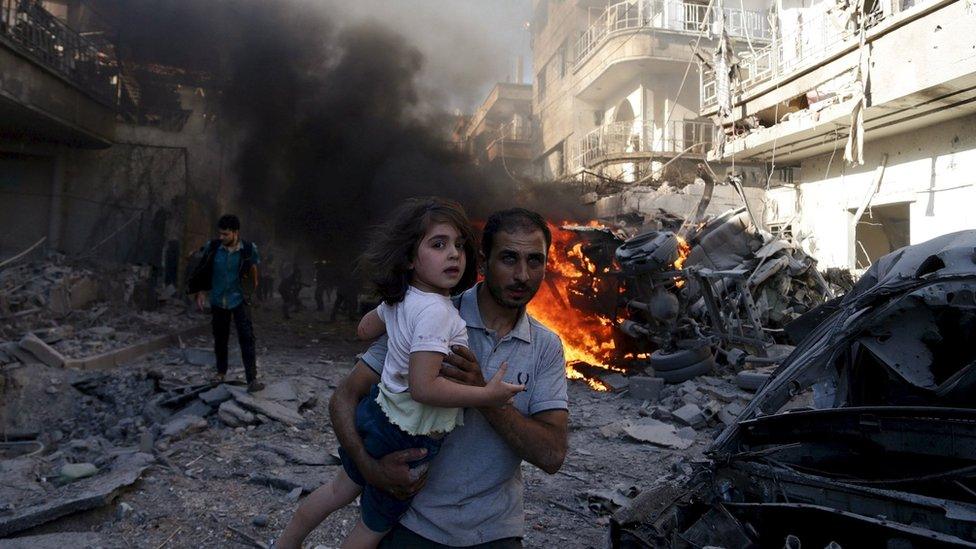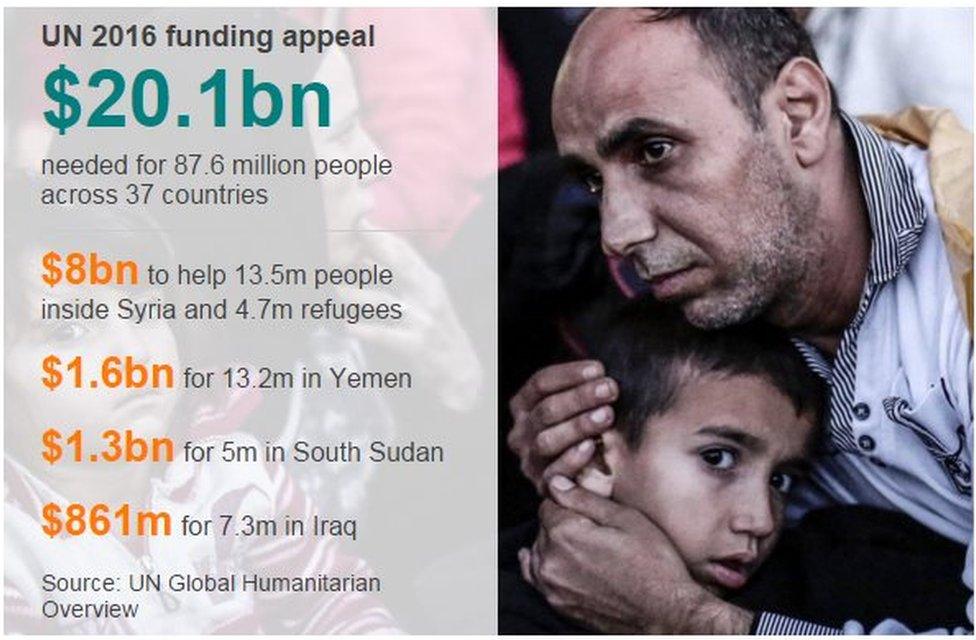UN seeks record $20bn for humanitarian aid in 2016
- Published

Eight billion dollars of the appeal is intended for people affected by the conflict in Syria
The UN is appealing for $20.1bn (£13.3bn) to fund aid operations in 2016, with two-fifths needed to help those affected by the war in Syria.
UN aid chief Stephen O'Brien said, external suffering in the world had reached levels not seen in a generation, with 87 million people needing urgent help.
An unprecedented number of people have also been driven from their homes.
Alongside Syria, the crises in Iraq, South Sudan and Yemen are expected to remain top humanitarian priorities.
The UN also warned that humanitarian organisations were approaching the end of this year with less than half of the 2015 appeal funded by donors.
Millions 'on edge of survival'
The record $20.1bn appeal, external for 2016 is a stark reflection of just how many crises the world is facing, reports the BBC's Imogen Foulkes in Geneva.
Ten years ago, the UN asked for less than a quarter of that - just $4.7bn.

'Humanitarian test of our time' - Lyse Doucet, BBC News, Damascus
We move across Kisweh, through neighbourhoods controlled by the government and in and out of opposition areas, with a Unicef team.
The UN children's agency takes the lead on water and education in the UN's response to what it has long described as "the humanitarian test of our time".
Like other UN agencies, it's asking for a record sum of money in this year's humanitarian response plan being announced in Geneva.
Daily life in Syria is 'worse than death', say people in Kisweh, on the outskirts of Damascus
"The needs are becoming bigger and bigger and it's very difficult to visualise it for the rest of the world," remarks Razan Rashidi, Unicef's communication officer in Syria, who's travelling with us.
"It's even difficult for Syrians to understand the scale of destruction."
Look at the drawn faces, as grey as the concrete buildings all around them, and you start to understand.
Syria crisis: The civilians living a 'life worse than death'

The UN said more than 125 million people across the world needed humanitarian assistance and that aid organisations aimed to provide urgent help to 87.6 million of the most vulnerable and marginalised in 37 countries next year.
"Suffering in the world has reached levels not seen in a generation. Conflicts and disasters have driven millions of children, women and men to the edge of survival. They desperately need our help," said Mr O'Brien, the UN's under-secretary-general for humanitarian affairs and its emergency relief co-ordinator.
The UN believes that the conflicts in Syria, Iraq, South Sudan and Yemen will remain among the "greatest drivers of prolonged humanitarian needs" in 2016, fuelling new displacement within countries and across borders.

More than $3.2bn is sought to help the estimated 13.5 million people inside Syria who are in need of help, and a further $4.8bn for the 4.7 million refugees from the country sheltering in neighbouring states.
Worldwide, the number of people forced to flee their homes has already reached 60 million, a level previously unknown in the post-World War Two era.
"The international humanitarian system is all too often the only safety net that exists for people fleeing wars. It has to be funded on a scale that's realistic and commensurate with today's immense challenges," said the UN High Commissioner for Refugees, Antonio Guterres.
"It is clear that with the present level of resources, we are not able to provide even the very minimum in both core protection and life-saving assistance."
The UN is asking donor countries to provide cash quickly, but our correspondent says that may be a vain hope, with last year's $19.9bn appeal only 49% funded.